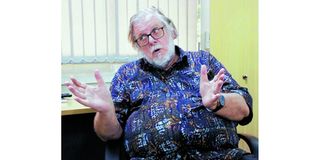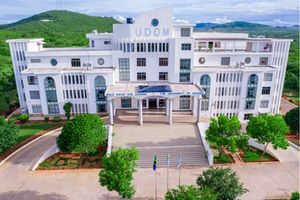Mabala’s 40 years in Tanzania and advice on Kiswahili

‘Mabala the Farmer’ author Richard Mabala gestures during an exclusive interview with Mwananchi Communications Limited (MCL) journalists at the publishers’ offices at Tabata Relini in Dar es Salaam on Thursday. PHOTO| SUNDAY GEORGE
What you need to know:
- Celebrating 40 years as a Tanzanian citizen, renowned author Richard Mabala believes that the country’s education system should make Kiswahili the language of instruction from primary to university
Dar es Salaam. Richard Mabala, a famous author, is convinced that Tanzanian education would be more useful once the decision to make Kiswahili the language of instruction at all levels is implemented.
Clocking 40 years since he was granted Tanzanian citizenship in 1982, Mr Mabala, author of among others Mabala the Farmer was offering his snippet of thoughts in an exclusive interview with The Citizen on Thursday.
Despite the fact that most of his works are in English, Mr Mabala is one of the few people who have been consistent in promoting the use of Kiswahili as a language of instruction from primary school to university.
The author explains that the basis of education is creativity and understanding which is why so many countries in the world make sure that they teach their children in a language they understand best.
“The Dutch, Swedes, France and others have the ability to use English as the language of instruction but they do not do so because they know that the basis of education and creativity is understanding. And they also know that scientists are often the worst when it comes to language learning,” he notes.
He then goes on to say that if a conducive environment is created for children, they can become fluent in English as well as have an understanding of all the important aspects of education.
“I did not know Swahili, but I learned it and understood it well. I did not know Spanish at all but in just two years, only within school, I was able to get a ‘B’ at A-Level. Because of good teaching, careful planning as well as my efforts. So nothing is impossible,” he observes.
“This is a matter of decision and preparation. We can say that we have decided that Kiswahili should be the language of instruction from 2025, so that we have three years to prepare…,” he advises.
He adds that after that there will be exams in English and Kiswahili for each student to choose which exam to take.
But, speaking to The Citizen in an interview, the Minister for Education, Science and Technology, Prof Adolf Mkenda, said that the 2014 education policy allows for the use of Kiswahili only or English only or a combination of basic Kiswahili in primary and English in secondary schools.
“I have spoken to our educational institution and noted that they have even prepared textbooks for those who want to teach only in Kiswahili, but our problem is not language, but teaching,” he said.
He said there is a need to prepare teachers, noting that the concept of using only Kiswahili for teaching has not been seen as helpful because even Kiswahili writing is becoming more and more problematic.
“Kiswahili is also a challenge, so even if it is taught on its own, it is still a challenge. The quality of education is a key factor here…,” said Prof Mkenda.
About Mabala
For most secondary school students, when the name Richard Mabala is mentioned, the first thing they will recall are his famous novels Mabala the Farmer and Hawa the Bus Driver. Others will remember him for his English poems.
Mr Mabala is English who arrived in 1973 under the Voluntary Service Oversea (VSO) .
His baptismal name was Richard Satterthwaite. However, he later joined the Ipuli choir in Tabora where his fellow singers said that they could not pronounce his name, thus gave him the name ‘Mabala’.
After a while, Mr Mabala decided to become a full citizen of Tanzania. His citizenship pursuit began in 1979 and he became Tanzanian in 1982.
He says he has never regretted his decision to change his citizenship.
despite being forced to go through a long process of applying for a Visa whenever he wants to visit his mother in the UK.





